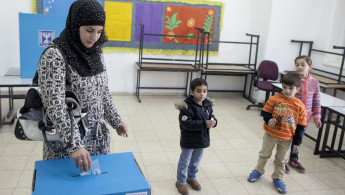Israeli election exit polls: Historic day for Palestinian Israelis
Meanwhile, the elections show a historic result for Palestinians with Israeli citizenship, who turned out in record numbers. The Joint List, a coalition of the main Arab parties, came in third place with 13 seats, according to exit polls.
In the lead, neck-and-neck
| Netanyahu had lagged behind the centre-left Zionist Union in opinion polls ahead of the vote. |
Figures published by public Channel 1 and private Channel 10 television both gave Netanyahu's Likud and Isaac Herzog's Zionist Union 27 seats each in the 120-member parliament.
A third poll by private Channel 2 gave Likud a one-seat lead on the Zionist Union, with the ruling party taking 28 seats in the Knesset.
Netanyahu had lagged behind the centre-left Zionist Union in opinion polls ahead of the vote, which is seen as a referendum on his six-year premiership.
Even if his Likud party comes second, Netanyahu could stay in power by forging a coalition with rightwing allies.
The outcome of the vote is likely to determine the prospects for new Middle East peace talks and Israel's troubled relations with its US ally.
In a last-ditch appeal to the far-right ahead of the polls, Netanyahu ruled out the establishment of a Palestinian state if re-elected, effectively reneging on his 2009 endorsement of a two-state solution.
Zionist Union leader Herzog, head of the Labour Party, has repeatedly called for the creation of a Palestinian state alongside Israel.
Palestinian Israelis vote
Turnout was unusually high among Palestinian Israelis, who account for just over 20 percent of the population, after the main Arab parties joined forces to challenge Netanyahu.
The Arab Joint List took third place with 13 seats, according to exit polls. Some 5.8 million people were eligible to vote, with 25 parties vying for the Knesset.
"I'd like to see Netanyahu disappear for many, many years. The most important issue is relations with the Palestinians," said Shulamit Laron, as music blasted from a nearby shop whose walls and door were plastered with pictures of "Bibi" - the burly Israeli leader.
Even if Likud does lose, Netanyahu could remain in office by virtue of Israel's complex proportional representation system.
The prime minister is not the head of the party that gains the most seats, but whoever can build a coalition commanding a majority of at least 61 seats in parliament.
Netanyahu put security at the forefront of his campaign, arguing he is the only one capable of protecting Israel from an Iranian nuclear threat.
Israel's electoral authorities blocked the broadcast of a press conference Tuesday by Netanyahu as voters went to the polls, saying that "propaganda" was banned on election day.
| Netanyahu argued he is the only one capable of protecting Israel from an Iranian nuclear threat. |
It is Israel's third election since 2009 and the biggest challenge yet for Netanyahu, who is seeking a third consecutive term, and a fourth in total.
Even if the Zionist Union wins the most votes, Herzog will face an almost impossible task of cobbling together a majority without forming a unity government with Likud - an option Netanyahu has ruled out.
In the mixed Jewish-Arab port city of Haifa, around 50 people lined up outside an Arab school to cast their vote.
"This is the first time that I've seen so many people here to vote," said Ehab Hamam, a 37 year-old Arab-Israeli working in hi-tech.
"For the Arabs, voting in this election is saying to the right: We are here," he said.
"I've never seen such a long queue outside a polling station," agreed 73-year-old Jewish Israeli voter Gideon Leber.
'Historic day for Arabs'
Ayman Odeh, head of the Arab Joint List, said it was a "historic day" for Israel's Arab minority because it would have a greater influence in parliament.
The high Palestinian Israeli turnout prompted a last-minute appeal from Netanyahu to his supporters.
"The rule of the rightwing is in danger. Arab voters are going to the polls in droves!" he said in a video on Facebook. "Go to the polling stations! Vote Likud!"
"I voted for the Arab List because solidarity between Jews and Arabs is important for me," said Karin Michael, a 40-year-old book publisher enjoying the sunshine in Tel Aviv where pavement cafes were packed.
But Natalie, a voter in her early 20s, said she voted for Naftali Bennett's far-right Jewish Home party, which opposes a Palestinian state.
"He represents what I believe in: the importance of the state of Israel, and of not giving any of it away to the Arabs."




 Follow the Middle East's top stories in English at The New Arab on Google News
Follow the Middle East's top stories in English at The New Arab on Google News


